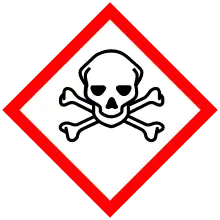 | |
| Names | |
|---|---|
| Preferred IUPAC name
2-(Propan-2-ylidene)hydrazine-1-carbothioamide | |
| Other names
(Propan-2-ylideneamino)thiourea Acetone thiosemicarbazide Dimethyl ketone thiosemicarbazone Thiosemicarbazone acetone NSC 711 2-(1-Methylethylidene)hydrazinecarbothioamide | |
| Identifiers | |
3D model (JSmol) |
|
| Abbreviations | ATSC |
| ChEMBL | |
| ChemSpider | |
| ECHA InfoCard | 100.015.580 |
| EC Number |
|
PubChem CID |
|
| UNII | |
CompTox Dashboard (EPA) |
|
| |
| |
| Properties | |
| C4H9N3S | |
| Molar mass | 131.20 g·mol−1 |
| Appearance | White crystals |
| Melting point | 172 to 175 °C (342 to 347 °F; 445 to 448 K) |
| Hazards | |
| Occupational safety and health (OHS/OSH): | |
Main hazards |
Toxic |
| GHS labelling: | |
  | |
| Danger | |
| H300, H312, H330 | |
| P260, P264, P270, P271, P280, P284, P301+P310, P302+P352, P304+P340, P310, P312, P320, P321, P322, P330, P363, P403+P233, P405, P501 | |
| NFPA 704 (fire diamond) | |
| Safety data sheet (SDS) | MSDS |
Except where otherwise noted, data are given for materials in their standard state (at 25 °C [77 °F], 100 kPa).
Infobox references | |
Acetone thiosemicarbazone is a chemical compound with the molecular formula C4H9N3S. It is used in the plastics industry in the manufacture of polyvinyl chloride (PVC) to terminate the polymerization process.[2][3]
It is classified as an extremely hazardous substance in the United States as defined in Section 302 of the U.S. Emergency Planning and Community Right-to-Know Act (42 U.S.C. 11002), and is subject to strict reporting requirements by facilities which produce, store, or use it in significant quantities.[4]
Toxicity
Symptoms of exposure
Symptoms of acute exposure to acetone thiosemicarbazide may include nausea, vomiting, eye and skin irritation, excessive salivation, pulmonary edema, hyperglycemia, and seizures.[5]
References
- ↑ Acetone thiosemicarbazone, chemicalland21.com
- ↑ US patent 3637632, Traynor, Lee, "Agents for shortstopping free radical polymerization of vinylidene monomers", issued 1972-Jan-25
- ↑ Acetone thiosemicarbazone (ATSC) Archived February 27, 2012, at the Wayback Machine, 88chem.com
- ↑ "40 C.F.R.: Appendix A to Part 355—The List of Extremely Hazardous Substances and Their Threshold Planning Quantities" (PDF) (July 1, 2008 ed.). Government Printing Office. Archived from the original (PDF) on February 25, 2012. Retrieved October 29, 2011.
{{cite journal}}: Cite journal requires|journal=(help) - ↑ "ACETONE THIOSEMICARBAZIDE | CAMEO Chemicals | NOAA".
This article is issued from Wikipedia. The text is licensed under Creative Commons - Attribution - Sharealike. Additional terms may apply for the media files.
